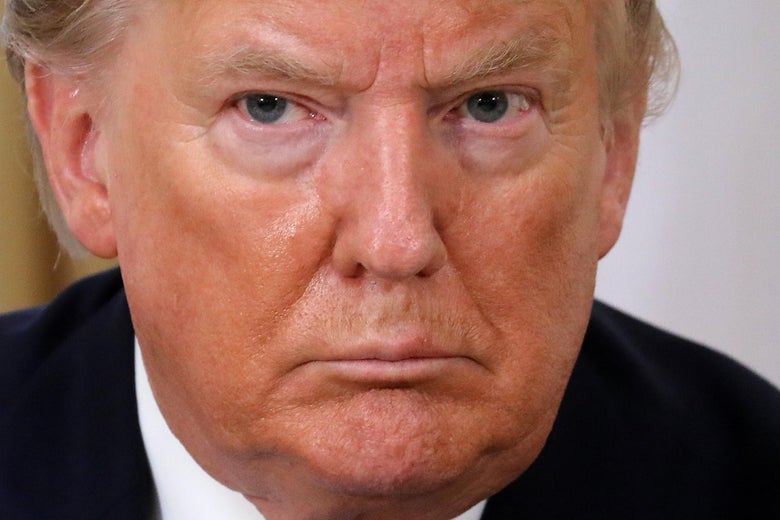
President Donald Trump listens as France’s President Emmanuel Macron speaks during their meeting at Winfield House in central London on December 3, 2019.
LUDOVIC MARIN/Getty Images
A federal appeals court upheld the House of Representatives’ subpoena of Donald Trump’s financial records on Tuesday, continuing Democrats’ winning streak in their fight for oversight of the president. But the victory may be temporary: This battle is probably heading to the Supreme Court, forcing the justices to decide in the midst of the 2020 election whether they will help Trump avoid congressional scrutiny.
Tuesday’s decision compels Deutsche Bank and Capital One to comply with subpoenas issued by House committees. The subpoenas seek financial records from Trump, his family, and his company. Trump intervened, asking a federal judge to block the subpoenas as an invalid exercise of congressional power. The judge refused, so Trump appealed to the U.S. Court of Appeals for the 2nd Circuit. In an opinion written by Judge Jon O. Newman, a three-judge panel for the court affirmed the judge’s decision.
Newman’s reasoning closely tracks an October decision from the U.S. Court of Appeals for the District of Columbia Circuit, which upheld a similar House subpoena of Mazars, Trump’s former accounting firm. A long line of Supreme Court precedent, Newman noted, requires courts to honor a congressional subpoena so long as it furthers some “legitimate legislative purpose.” After all, the power to issue subpoenas pursuant to an investigation is “a necessary and appropriate attribute of the power to legislate.”
Here, the committees noted that Deutsche Bank was fined for its role in a $10 billion Russian money-laundering scheme, while Capital One paid a $100 million fine for failing to carry out anti-money laundering rules. Lawmakers sought to learn whether the Trumps were exploited or manipulated by foreign actors. This concern is heightened by the fact that Deutsche Bank extended $2 billion in loans to Trump when no other bank would lend to him. The committees need this information to help them craft legislation that would guard against money laundering, conflicts of interest in the executive branch, and foreign interference in elections. (Indeed, the House has already passed some bills furthering these aims and is actively considering others.)
In light of this record, Newman found that the House subpoenas “easily pass” legal muster. He therefore declined to “interfere with a lawful exercise of the congressional authority of the Legislative Branch.” The courts, he concluded, must direct Deutsche Bank and Capital One to turn over the requested documents.
Newman was appointed by Jimmy Carter; his decision was joined by Judge Peter Hall, a George W. Bush appointee. Another Bush appointee, Judge Debra Ann Livingston, dissented. She described the subpoenas as “deeply troubling” and argued that Trump “raised serious questions” about their legality that implicate “the ability of this and future Presidents to discharge the duties of the Office.” Livingston would thus send the case back down to district court, directing the judge to limit their scope.
Trump may appeal Tuesday’s decision to the full court, but the Second Circuit rarely takes cases en banc, with every judge sitting. The president recently flipped the Second Circuit, creating a majority of Republican appointees. But Hall’s support for Newman’s opinion makes it highly unlikely that the court’s conservative faction will reverse the ruling. Still, if the full court refuses to rehear the case, Trump’s five appointees will have an opportunity to dissent—just as his appointees to the D.C. Circuit did when the court upheld the House’s Mazars subpoena. Trump’s judges appear to be lobbying the Supreme Court through these dissents, urging the justices to run interference for the president.
The Supreme Court temporarily blocked the Mazars subpoena in November, and seems poised to determine its constitutionality in 2020. If Trump eventually appeals the Second Circuit’s decision to SCOTUS, it may hear the two cases together within the next few months. Congress’ authority to scrutinize the president will almost certainly be settled by the Supreme Court by the end of this term in June 2020, while Trump’s re-election campaign is in full swing. That means we may have to wait another half-year to learn whether Chief Justice John Roberts will bail out the president.
Readers like you make our work possible. Help us continue to provide the reporting, commentary and criticism you won’t find anywhere else.
Join Slate Plusfrom Slate Magazine https://ift.tt/2Pbpb2a
via IFTTT
沒有留言:
張貼留言